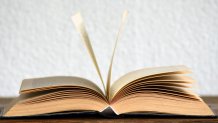
The poems also respond to Golding’s novel The Inheritors, which describes the last days of the Neanderthal people
New poetry inspired by Cornish author William Golding revealed on World Book Day
New poems by a University of Exeter expert – revealed on World Book Day - were inspired by the works of Cornish author William Golding and discoveries about the lives of Neanderthal communities.
Dr John Wedgwood Clarke’s work – seen here for the first time to mark the international celebration of reading - explores what could have happened when humans and the now-extinct species lived alongside each other for a significant period of time.
The poems also respond to Golding’s novel The Inheritors, which describes the last days of the Neanderthal people and our fear of the 'other' and the unfamiliar. Dr Clarke was able to read the William Golding notebooks, manuscripts and typescripts held in the University of Exeter’s Special Collections archive when he was writing the poems. Experts have found we share a very small amount of DNA with these early ancestors and Dr Clarke wanted to discuss if we could be haunted by this knowledge today.
The poems are part of a new exhibition at the Siobhan Davies Studios in London by the filmmakers Webb-Ellis. Dr Clarke has also penned the poems to respond to new work by the artists. Their film installation uses the motorways of Britain and Europe to question deeply held myths relating to human-beings and evolution. It documents a 13-year-old as she makes both a physical and metaphorical journey, seeing visions rising up from the roadside, which is a place alive with hidden meaning and associations. The poetry is part of the installation’s soundtrack, and Dr Clarke will read them at the launch of the exhibition.
Dr Clarke said: “For a long time humans have thought our language and habits were unique, but experts are discovering that Neanderthal’s had similar traits, and they co-existed with humans. I’ve been inspired by that to think about what it might have been like for these two groups of people to live together.
“It was inspiring to be able to read William Golding’s manuscripts. The Inheritors imagines how Neanderthal’s may have thought and spoke, and I found it incredibly moving. I hope my poems remind people what a great novel it is.”
The free event to launch the exhibition and the poems will be held on Saturday, 17 March. For more information see http://www.siobhandavies.com/whats-on/exhibitions/webb-ellis-inheritors-traces-commission/.
Mother, neanderthal mother, I glimpse you
on the footbridge gazing,
in the motorway plantation listening to us swarm,
as if approaching a god.
The shape of you on the window passes over
drivers entranced by arrival.
There is no arrival, only the pen’s confluence
of pylons nesting & un-nesting,
bridge shadows like wings, & you
in my wrist, your knowledge
snowing between high twigs,
at our mercy in arrangements of bones,
us at our own mercy who once cut you away, mother,
bent your knees, stooped your back,
excised your body from ours—
all the death you have eaten to get me here.
Date: 1 March 2018
